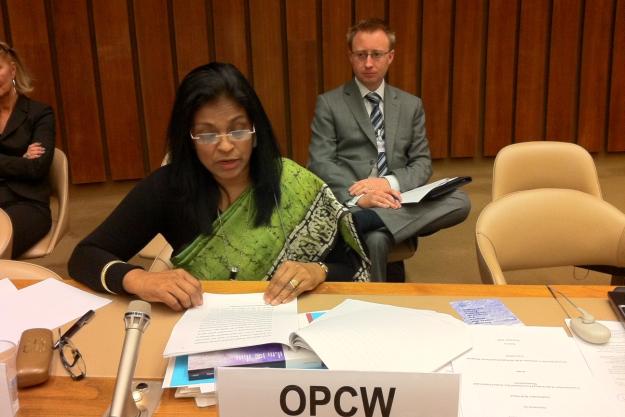
OPCW Deputy Director-General Mrs. Grace Asirwatham addresses the 7th Review Conference of the Biological Weapons Convention in Geneva on 6 Dec., 2011.
Mrs. Grace Asirwatham, the OPCW Deputy Director-General, delivered an address today to the general debate session of the conference, which is taking place at the United Nations Office in Geneva, Switzerland from 5 to 22 December 2011. She spoke at the invitation of the conference President, Ambassador Paul van den IJssel of the Netherlands.
The three-week conference is intended to review the implementation of what is formally known as the Biological and Toxin Weapons Convention (BWC for short) and to take decisions on its future direction. The Convention was opened for signature in 1972 and currently has 165 States Parties.
In her statement [PDF – 46 KB], the Deputy Director-General emphasised the shared history of the BWC and the Chemical Weapons Convention (CWC), which together represent “a crucial barrier against the use of disease or poison against humanity”. She reviewed the current status of CWC implementation and referred to the ongoing debate on the future priorities of the OPCW.
Mrs Asirwatham reported to the conference that three quarters of declared chemical weapons stockpiles will be destroyed by April 2012, which she termed “an achievement without parallel in disarmament.” She further noted that the OPCW has conducted more than 2,100 industrial inspections to date, and that the annual number will increase from 209 currently to 241 by 2014, which will help to broaden the geographical distribution of industry inspections and significantly reduce the intervals between inspections.
The Deputy Director-General cited four areas of common interest between the two treaties: full and effective national implementation; the impact of advances in science and technology; assistance and protection; and promoting the peaceful uses of chemistry and biology. She concluded by saying that, in preparing for its own 3rd Review Conference in April 2013, the OPCW can benefit from the experience of the BWC conference, and that the OPCW stands ready to provide its experience and expertise to BWC States Parties if so requested.
